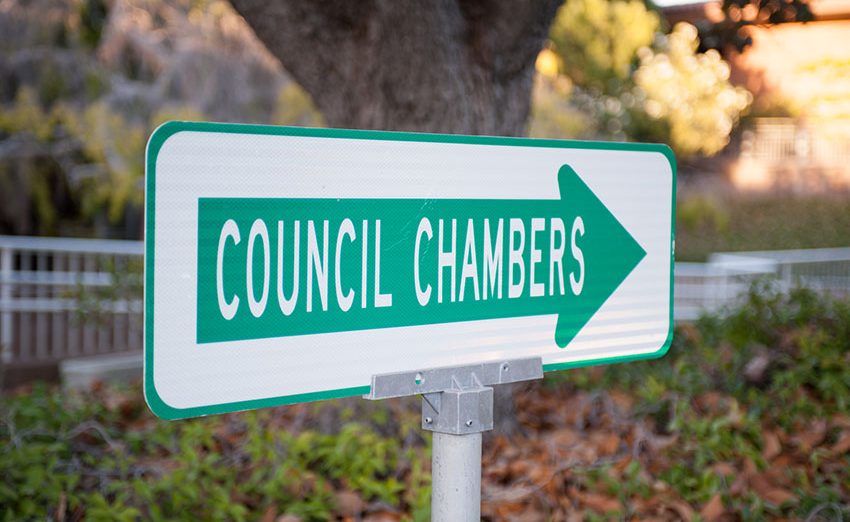A $6-million cash injection will help shore up Santa Clara’s general fund as well as contributing to affordable housing, transportation and COVID-19 relief.
At its Tuesday night meeting, the Santa Clara City Council allocated $1.59 million in federal money — dispersed as part of the Coronavirus Aid Relief and Economic Securities (CARES) Act — and another $5 million from a settlement with San Jose.
The settlement money came from a dispute that Santa Clara won regarding the impact of a development near Santana Row, dubbed Santana West. However, the settlement stipulated that the money needed to be spent on affordable housing or transportation.
A large chunk of the CARES money — $590,000 — went into the City’s Small Business Grant Program. Established in April, the program distributes $10,000 to nonessential businesses and $5,000 to essential businesses in one-time money. As of last month, the City has received more than 800 grant applications but was only able to issue 155 with the $1.1 million it allocated for the program.
With the City’s general fund depleted because of COVID-19-related spending, the remainder of the CARES money was put back into the general fund to fortify its balance and provide credits to residents on their solid waste utility bill.
Ruth Shikada, Assistant City Manager, told the Council that medical expenses, payroll, enforcing public health compliance, as well as the installation of COVID-19-related safety measures such as plexiglass dividers are all expenses reimbursable by CARES money.
Also, as part of the action, the Council approved upping the contract with the Bill Wilson Center as part of its rental assistance program, increasing the allocation from $1.3 million to $2.8 million.
Council Member Debi Davis, who chairs the committee that decided where to allocate the money, said it will “take care of the needs of the people.”
“It is something that will give people some peace of mind going forward,” Davis said.
Meanwhile, the settlement money will go, in almost equal parts, toward more than three miles of bike lane along Benton Street, an affordable housing project located at 1601 Civic Center Drive, and the Emergency Rental Assistance Program. The remaining $500,000 will go toward traffic improvements along Lick Mill Boulevard.
Shikada told the Council $200,000 of the money was set to go toward the City’s food distribution program, but U.S. Department of Agriculture money will now fund that effort.
City Limits Food Delivery Rate
The Council also voted unanimously to cap the rate that food delivery services like DoorDash and Uber Eats can charge.
Shikada told the Council that delivery fees have crept up slightly since the coronavirus-prompted shutdown. Now, with myriad restrictions on dining, many restaurants rely on delivery to stay afloat.
When city employees touched base with small businesses as part of its grant program, many complained that delivery fees had begun to soar, often as high as 30 percent.
Navin Tekchandani, a Santa Clara fine-dining restaurateur, said while business has floundered, rents remain high and the eight-mile delivery radius imposed by DoorDash and Uber Eats is restrictive, especially for fine-dining restaurants, which already have lower profit margins. Additionally, he said, corporate business is hurting.
“We are highly dependent on corporate revenue to survive as a fine-dine restaurant, which has almost disappeared,” he said. “It is highly crucial that Uber Eats and DoorDash, which account for 90 percent of delivery revenue that restaurants are earning right now, should reduce fees. The revenue for Uber Eats and Door Dash is already so high, so I’m sure they can easily afford it.”
The policy caps the delivery fee at 15 percent and went into effect immediately. The policy will remain in effect until City Manager Deanna Santana rescinds the local emergency proclamation she made in March.
Courthouse Talks Continue
The Council also directed the City Manager’s office to send the letter it drafted inquiring about the state selling or redeveloping the courthouse.
Discussions surrounding the development of the City’s downtown and how the courthouse literally stands in the way of that endeavor dominated the Council’s Aug. 25 meeting. At that meeting, the Council directed Santana to draft a letter to the state, which she presented Tuesday night.
Manuel Pineda, Assistant City Manager, also updated the Council on the status of the City’s Downtown Precise Plan — a six-acre area bound by Benton, Lafayette, Madison and Homestead. In addition to allocating $500,000 for consulting services over the past few years, the Council also approved allocating $1.8 million to execute options on easements on sections of Franklin and Washington Streets.
Further, Pineda said, the Downtown Community Task Force, which meets again Sept. 10, will begin having monthly meetings in September.
The City Manager’s office will report back to the Council on budget strategies at a later date.
The Council meets again Tuesday, Sept. 29 in the Council Chambers at City Hall, 1500 Warburton Ave. in Santa Clara.
Members of the public can participate in the City Council meetings on Zoom at https://santaclaraca.zoom.us/j/99706759306; Meeting ID: 997-0675-9306 or call 1(669) 900-6833, via the City’s eComment (available during the meeting) or by email to PublicComment@santaclaraca.gov
For those without the above access, the City cafeteria has been set up to accommodate up to 10 people at a time and public comment will be given from that location.







